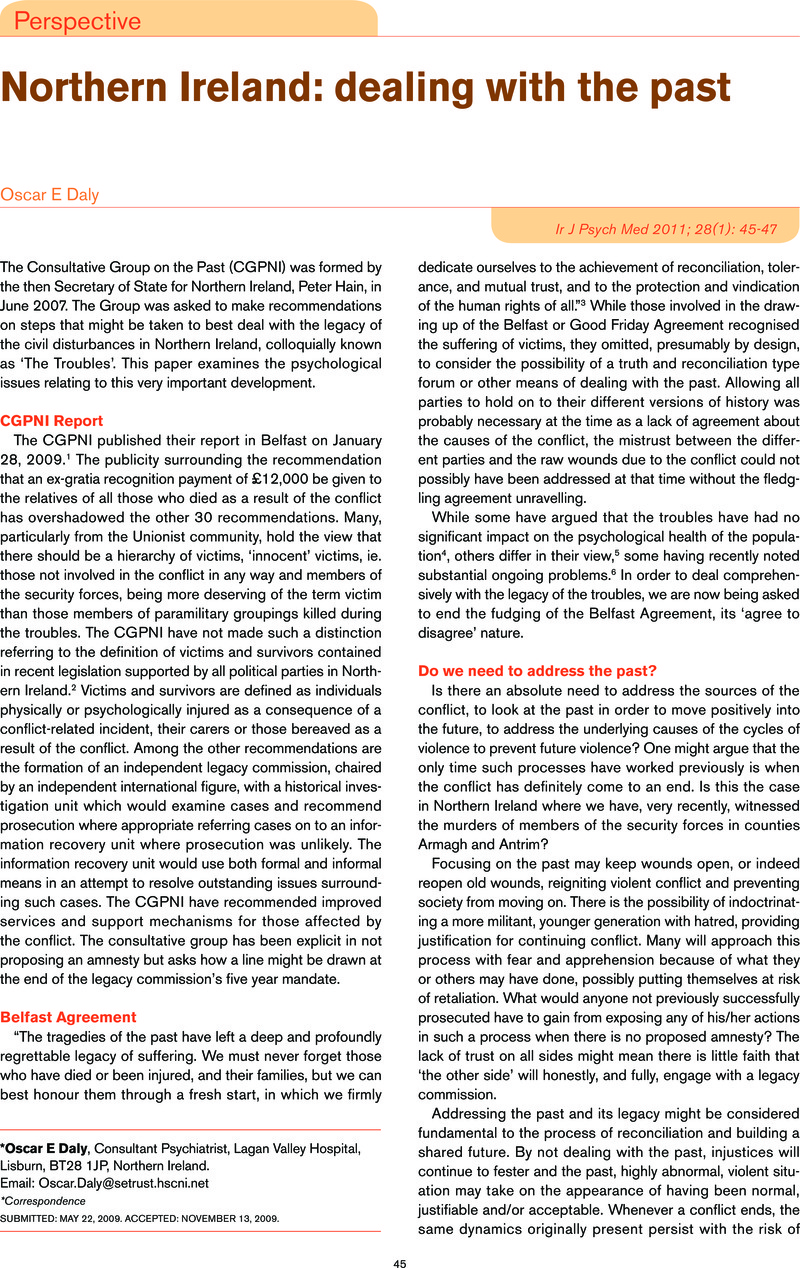No CrossRef data available.
Article contents
Northern Ireland: dealing with the past
Published online by Cambridge University Press: 13 June 2014
Abstract
An abstract is not available for this content so a preview has been provided. Please use the Get access link above for information on how to access this content.

- Type
- Perspective
- Information
- Copyright
- Copyright © Cambridge University Press 2011
References
1.Report of the Consultative Group on the Past, Belfast, 28 January 2009. HYPERLINK “http://www.cgpni.org/fs/doc/Consultative%20Group%20on%20the%20Past%20Full%20Report.pdf” http://www.cgpni.org/fs/doc/Consultative%20Group%20on%20the%20Past%20Full%20Report.pdf.Google Scholar
2.Victims and Survivors (Northern Ireland) Order (2006). Statutory Instrument 2006, No. 2953 (N.I.17).Google Scholar
4.Curran, P.S., Miller, P.W.Psychiatric implications of chronic civilian strife or war: Northern Ireland. Advances in Psychiatric Treatment, 2001; 7: 73–80.CrossRefGoogle Scholar
5.Daly, O.E.Northern Ireland. The Victims. Br J Psychiatry, 1999; 175: 201–204.CrossRefGoogle ScholarPubMed
6.McDonald, G. Mental health consequences of long term conflict. BMJ, 2007; 334: 1121–1122.CrossRefGoogle ScholarPubMed
8.Corkalo, D, Ajdukovic, D, Weinstein, H, Stover, E, Djipa, D and Biro, M. Neighbours again? Inter-Community Relations after Ethnic Violence. In: Stover, Eric and Weinstein, Harvy (Eds.). My neighbour, my enemy: Justice and community in the aftermath of mass atrocity. Cambridge University Press. pp. 143–161, 2004.CrossRefGoogle Scholar
9.Gilligan, C. Traumatised by Peace? A critique of 5 assumptions in the theory and practice of conflict-related trauma policy in Northern Ireland. Policy and Politics, 2006; 34(2): 325–344.CrossRefGoogle Scholar
10.Healing through Remembering. The Viability of Prosecution based on Historical Inquiry. Observations of Counsel on potential evidential difficulties. Belfast, October 2006. HYPERLINK “http://www.healingthroughremembering.org/pdf/TheViabilityof20Prosecution.pdf” http://www.healingthroughremembering.org/pdf/TheViabilityof20Prosecution.pdf.Google Scholar
11.Basoglu, M, Livanou, M, Crnobaric, C, Franciskovic, T, Suljic, E, Duric, D, and Vranesic, M. Psychiatric and cognitive effects of war in former Yugoslavia: Association of lack of redress for trauma and post traumatic stress reactions. JAMA, 2005; 294(5): 580–590.CrossRefGoogle Scholar
12.Stein, DJ. Psychiatric Aspects of the Truth and Reconciliation Commission in South Africa. Br J Psychiatry, 1998, 173, 455–457.CrossRefGoogle ScholarPubMed
13.De Jong, JVTM. Psychiatric Problems related to persecution and refugee status. In: Henn, F, Sartorius, N, Helmchen, H, Lauder, H (Eds.) Contemporary psychiatry, vol II, pp 279–299, Berlin, Springer, 2000.Google Scholar
14.Muldoon, OT, Schmid, K and Downes, C. Political Violence and Psychological Wellbeing: The Role of Social Identity. Applied Psychology, 2009, 58, 1, 129–145.CrossRefGoogle Scholar
15.Kellezi, B, Reicher, S and Cassidy, C. Surviving the Kosovo Conflict: a Study of Social Identity, Appraisal of Extreme Events, and Mental Wellbeing. Applied Psychology, 2009; 58(1): 59–83.CrossRefGoogle Scholar
16.Kaminer, D, Stein, D, Mbanga, I and Zungu-dirwayi, N. The Truth and Reconciliation Commission in South Africa: relation to psychiatric status and forgiveness among survivors of human rights' abuses. Br J Psychiatry, 2001, 178, 373–377.CrossRefGoogle ScholarPubMed
17.Biruski, D, Ajdukovic, D. Separate schools – a divided community: the role of the school in post-war social reconstruction. Review of Psychology, 2007, 14, 2, 93–108.Google Scholar
18.Patterson, MC, Poole, AD, Drew, KJ and Harkin, N. The psychological and physical health of police officers retired recently from the Royal Ulster Constabulary. Ir J Psychology, 2001; 22(1): 1–27.CrossRefGoogle Scholar
19.EHSSB Trauma Advisory Panel. Dealing with the past, looking to the future: Values, Principles and Recommendations for the Care and Support of Participants in any potential ‘Dealing with the Past’ process. Eastern Health and Social Services Board, Belfast, 2006. HYPERLINK “http://www.ehssb.n-i.nhs.uk/traumaadvisorypanel.NSF/f0347c0c37b25ebc8025720d00588abf/bf645aaf5b3f392480257214003f8631?OpenDocument” http://www.ehssb.n-i.nhs.uk/traumaadvisorypanel.NSF/f0347c0c37b25ebc8025720d00588abf/bf645aaf5b3f392480257214003f8631?OpenDocument.Google Scholar
20.Roulston, B., Scraton, P. In the Full Glare of English Politics. Ireland, Inquiries and the British State, Br, J, Criminol, 2005; 45: 547–564.Google Scholar
21.Jarman, N. From War to Peace? Changing patterns of violence in Northern Ireland, 1990-2003. Terrorism and Political Violence, 2004; 16(3): 420–428.CrossRefGoogle Scholar




